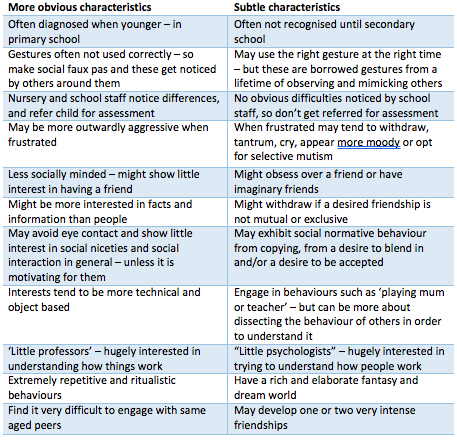|
When looking at the research, different studies, together with anecdotal evidence, there are various results in ratios between males and females identified as autistic, ranging from 2:1 to 16:1, respectively! So why are there such differences across studies? There are several possible reasons for this, some of them being:
The below table illustrates the differences between more obvious characteristics of Autism compared to more subtle characteristics (National Autistic Society): Often, I hear parents say that their daughter’s teachers don’t notice any ‘problem’ in the classroom, and in fact, they’re considered the perfect student! This is often quite distressing for parents as their child may to experience intense emotional outbursts the moment they arrive home. Girls tend to mask their behaviours quite well, as they are more motivated to engage socially. They spend excessive amounts of energy doing so at school, as to not get noticed and fly under the radar. Because of this mental and emotional exhaustion, here comes the meltdowns when they finally feel like they can be ‘themselves’. The expressive language used by autistic females is often exceptionally good, which can then mask their difficulties processing verbal information. Their eye contact might also be quite good, they may do ‘small talk’ well and can be very chatty, though these tend to be quite exhausting and when their energy is not replenished, can cause significant distress and other mental health conditions over time. Females who seek therapy present with mental health issues such as eating disorders, personality disorders, depression, anxiety and self-harming behaviours that can divert the clinician’s attention away identifying these individuals as autistic. Mothers who identify with having autistic characteristics are typically the ones who bring their young daughters into therapy or for assessment, as they notice the difficulties in their child as similar to their own difficulties, and don’t want their child to go through the same challenges as they did growing up. Our mission at Hopscotch and Harmony is to smash the stigma of mental health conditions and a big part of our work is working with young children, teens and adults who are autistic. There is so much support out there and this will continue to grow as our understanding of autistic needs deepens. Listening to so many autistic individuals talk about their relief and enhancement of self-understanding when the assessment process identifies them as autistic are some of the benefits of going through the formal assessment process. Though this is not true for everyone. Some people identify with having autistic characteristics or self-diagnose as being autistic, and are content with being aware of their strength and struggles, and don’t want a formal assessment. Some people may overly-identify with a diagnosis and feel like ‘something is wrong with them’. This is where clinical judgement and parental intuition come into play… there is never a black and white answer, is there? Many psychologists at Hopscotch and Harmony are highly skilled in the autism assessment process. If you want more information on this process, please complete our assessment booking enquiry form FOUND HERE Comments are closed.
|
Categories
All
|
Hopscotch & HarmonyAt Hopscotch & Harmony Psychology, you can expect compassionate care and evidence-based guidance on your journey to wellness.
With clinics in Werribee and Belmont, as well as providing online counselling to clients who live throughout Australia, our dedicated team of psychologists and dietitians are committed to providing support to children, teenagers and adults. With a focus on understanding your unique needs, we offer tailored solutions to foster growth and resilience. Trust in our experience and dedication as we work together towards your well-being. Welcome to a place where healing begins and possibilities abound. |
Our services |
Contact usHopscotch & Harmony
Child, Teen and Adult Psychology Our Locations:
WERRIBEE: 1/167-179 Shaws Rd
BELMONT: 92 Roslyn Rd AUSTRALIA-WIDE: Online counselling |
Hopscotch and Harmony respectfully recognise the Aboriginal and Torres Strait Islander people as the first Peoples of the continent now called Australia.
We acknowledge the Bunurong and Wadawurrung people of the Kulin Nation, the traditional owners of the land on which we work, and pay our respects to their Elders, past, present and emerging.
© 2024 Hopscotch and Harmony Pty Ltd



 RSS Feed
RSS Feed
